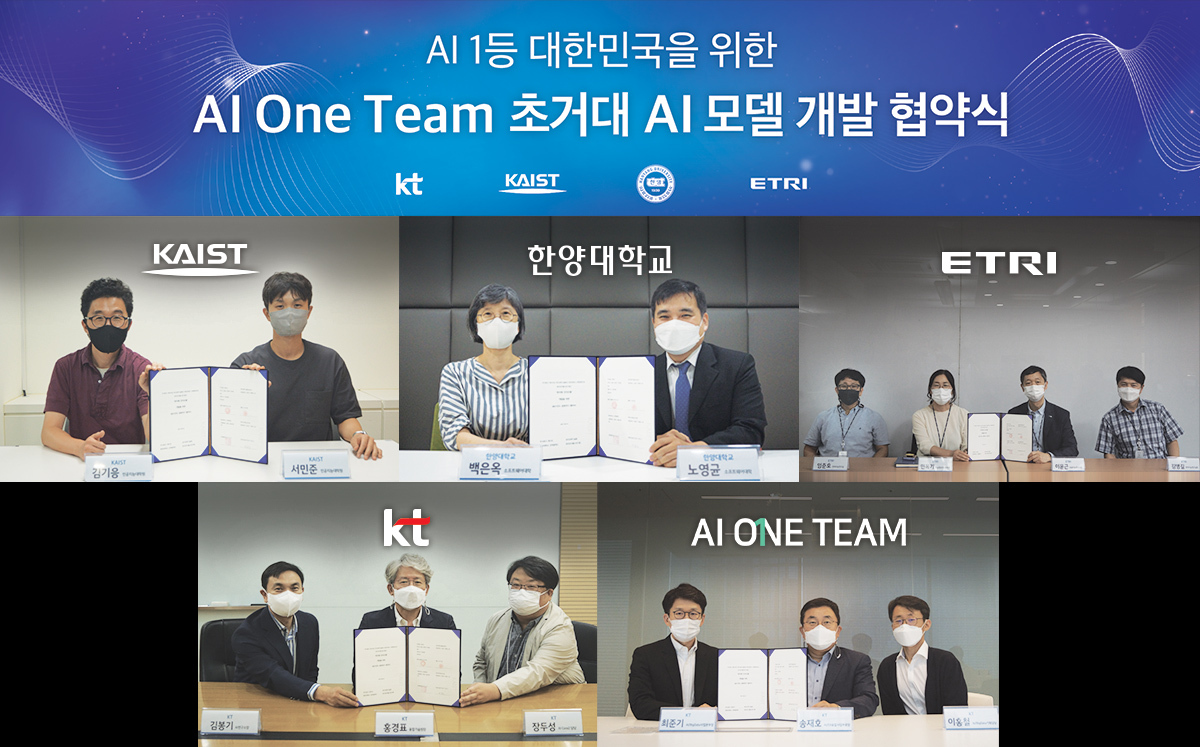 |
Officials from KT Corp., KAIST, Hanyang University, ETRI and AI One Team pose for a photo during an online signing ceremony Wednesday. (KT Corp.) |
KT Corp., South Korea’s leading mobile carrier, said Wednesday that it aims to debut a “hyperscale artificial intelligence” model by next year through joint research with universities and a state-run research center.
According to the company, AI One Team, a research alliance comprising representatives of industry, academia and a public research organization, has signed an agreement with KT to conduct the project together.
AI One Team involves 10 organizations, including the Korea Advanced Institute of Science and Technology, Hanyang University and the Electronics and Telecommunications Research Institute -- a research and development institute under the Ministry of Science, ICT and Future Planning.
Hyperscale AI refers to a highly sophisticated form of AI that uses and analyzes massive datasets to make autonomous decisions.
Under the agreement, KT will build the infrastructure for massive graphics processing units to create a system that could dramatically speed up data processing for deep learning. KT will also oversee the entire R&D process, including data collection, and take charge of the commercialization of the technologies later on.
Its two academic partners, KAIST and Hanyang University, will be responsible for optimizing the machine-learning algorithms and data filtering. The institutional partner, ETRI, will help develop the hyperscale model.
The consortium said it plans to finish training its hyperscale AI by the end of this year. It will then work to commercialize the platform within the first half of next year.
Currently under development is a hyperscale AI language model, which will first be applied to KT’s AI assistant Giga Genie and its AI customer service centers. The company plans to expand the model into other business sectors such as manufacturing, finance and logistics.
In line with such efforts, the group plans to develop the AI computing infrastructure to accommodate AI language models with more than 200 billion parameters.
Parameters are used to measure the sophistication of AI -- one of the largest AI language models ever trained is OpenAI’s GPT-3, which has 175 billion parameters.
KT and the other members are making efforts to resolve ethical issues. The consortium said it was developing algorithms to filter out “toxic content” so that its AI could make ethical, unbiased decisions.
“Developing a hyperscale AI model which combines world-class technologies and experiences of AI One Team has special meaning in securing core technology in the next generation of AI,” said Hong Kyung-pyo, an official from KT. “Through this project, we will contribute to strengthening the competitiveness of Korean AI.”
As automation fans demand for more sophisticated AI, Korean IT companies are rushing to develop their own hyperscale AI platforms.
Portal giant Naver said in May that it had developed “HyperCLOVA,” calling it the first large-scale AI trained in the Korean language.
Kakao Enterprise, an AI research lab under Kakao Group, partnered with two local universities in July to develop AI technologies.
By Kang Jae-eun (
kang.jaeeun@heraldcorp.com)








